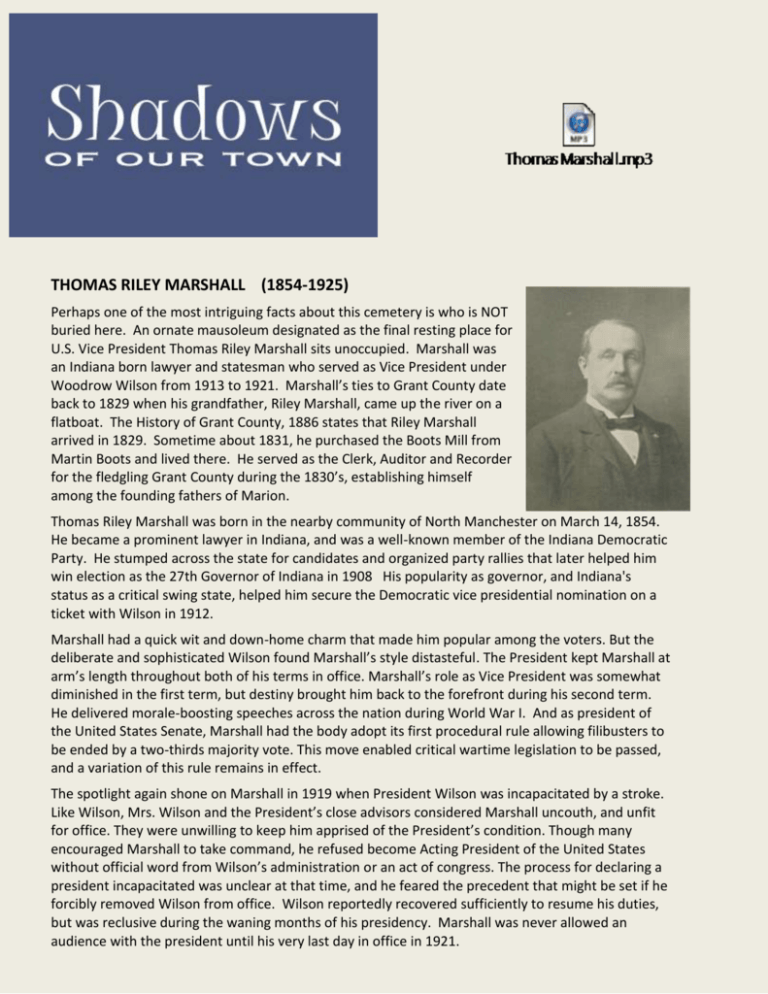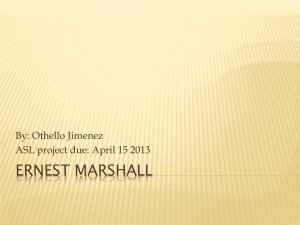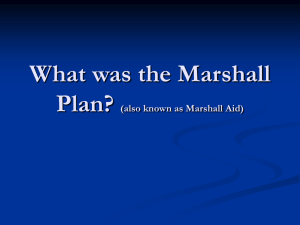U. S. Vice President Thomas Marshall
advertisement

THOMAS RILEY MARSHALL (1854-1925) Perhaps one of the most intriguing facts about this cemetery is who is NOT buried here. An ornate mausoleum designated as the final resting place for U.S. Vice President Thomas Riley Marshall sits unoccupied. Marshall was an Indiana born lawyer and statesman who served as Vice President under Woodrow Wilson from 1913 to 1921. Marshall’s ties to Grant County date back to 1829 when his grandfather, Riley Marshall, came up the river on a flatboat. The History of Grant County, 1886 states that Riley Marshall arrived in 1829. Sometime about 1831, he purchased the Boots Mill from Martin Boots and lived there. He served as the Clerk, Auditor and Recorder for the fledgling Grant County during the 1830’s, establishing himself among the founding fathers of Marion. Thomas Riley Marshall was born in the nearby community of North Manchester on March 14, 1854. He became a prominent lawyer in Indiana, and was a well-known member of the Indiana Democratic Party. He stumped across the state for candidates and organized party rallies that later helped him win election as the 27th Governor of Indiana in 1908 His popularity as governor, and Indiana's status as a critical swing state, helped him secure the Democratic vice presidential nomination on a ticket with Wilson in 1912. Marshall had a quick wit and down-home charm that made him popular among the voters. But the deliberate and sophisticated Wilson found Marshall’s style distasteful. The President kept Marshall at arm’s length throughout both of his terms in office. Marshall’s role as Vice President was somewhat diminished in the first term, but destiny brought him back to the forefront during his second term. He delivered morale-boosting speeches across the nation during World War I. And as president of the United States Senate, Marshall had the body adopt its first procedural rule allowing filibusters to be ended by a two-thirds majority vote. This move enabled critical wartime legislation to be passed, and a variation of this rule remains in effect. The spotlight again shone on Marshall in 1919 when President Wilson was incapacitated by a stroke. Like Wilson, Mrs. Wilson and the President’s close advisors considered Marshall uncouth, and unfit for office. They were unwilling to keep him apprised of the President’s condition. Though many encouraged Marshall to take command, he refused become Acting President of the United States without official word from Wilson’s administration or an act of congress. The process for declaring a president incapacitated was unclear at that time, and he feared the precedent that might be set if he forcibly removed Wilson from office. Wilson reportedly recovered sufficiently to resume his duties, but was reclusive during the waning months of his presidency. Marshall was never allowed an audience with the president until his very last day in office in 1921. Through it all, Marshall maintained his good humor. He is best remembered for his famous quote uttered as he presided over a lengthy senate hearing. During one senator’s windy presentation about “what this country needs” Marshall was overheard whispering to a friend, “What this country needs is a good 5 Cent Cigar.” Newspapers published the quip and the phrase was immortalized. Marshall died on June 1, 1925 after suffering a heart attack. His remains were returned to Indiana following his funeral in Washington DC. Marshall’s casket was unloaded from the train at a stop in Indianapolis. It is unclear whether he ever reached the space reserved for him in Marion, but records indicate he is currently interred at Crown Hill Cemetery in Indianapolis. Knowing Marshall’s famous sense of humor, one can imagine him laughing as we stand before the elaborately constructed resting place which will stand here forever empty.







